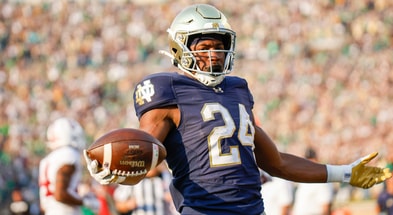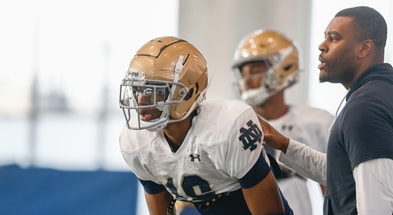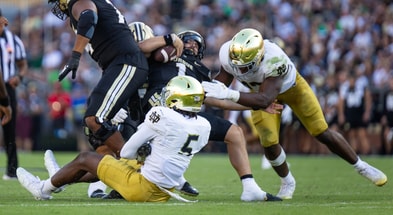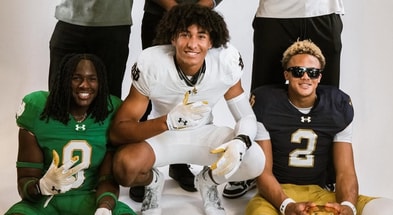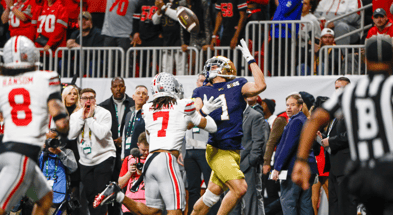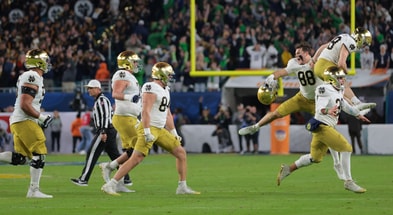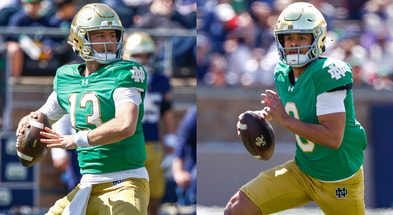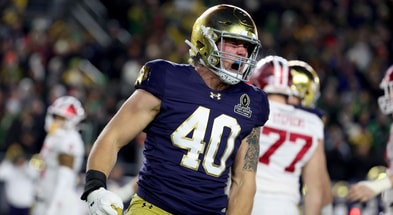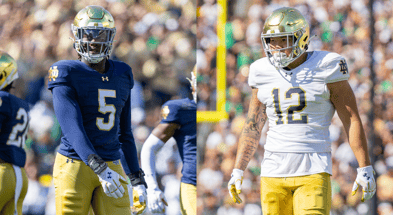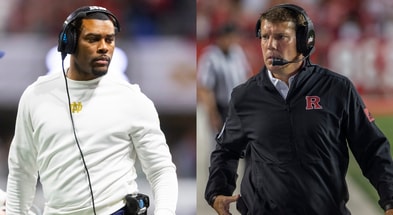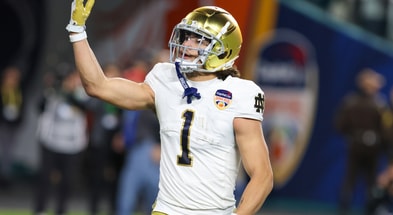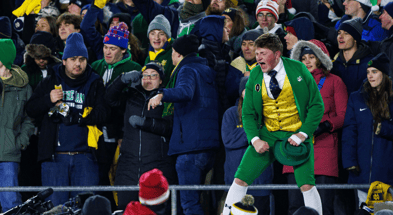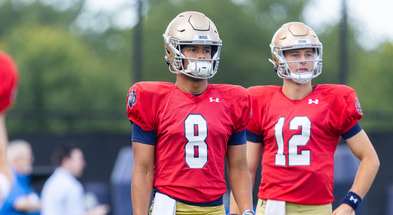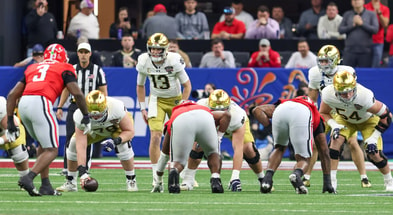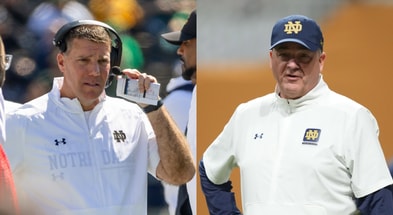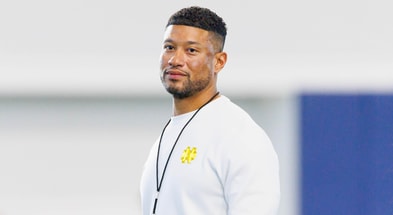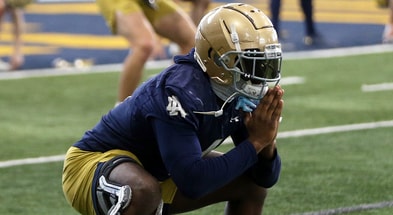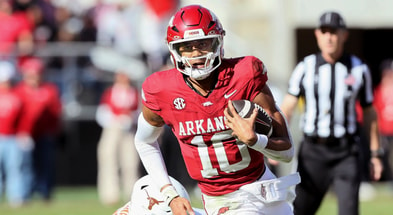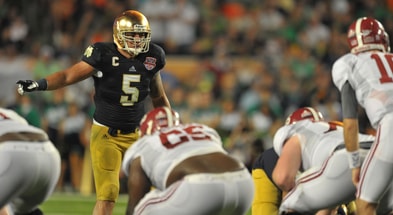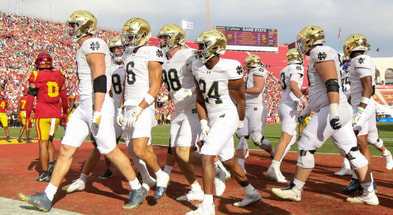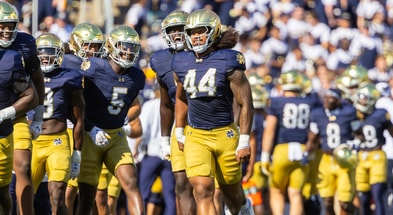Five things Notre Dame HC Marcus Freeman said on 'Big Noon Conversations' with Joel Klatt

On Monday morning, Fox Sports lead college football analyst Joel Klatt released a 30-minute interview with Notre Dame head coach Marcus Freeman.
Here are the five most interesting things Freeman had to say. For the full interview, click here.
Are there any other teams, besides Clemson, that you’d like to see Notre Dame play every year?
“I feel like you’re trying to get at a certain team that’s been buzzing. [laughs] I mean, you think about rivalries. And I’m sure you can go back to when you played high school football or even before that. I think back to my high school years. I was from Ohio, played at a high school named Hubert Heights, and our big rival was Centerville Elks. The guys that have come from Centerville that you might know: AJ Hawk, Kirk Herbstreit, Mike Nugent. Some really great players, but that was a huge rivalry. Then you go to Ohio State, and you play Michigan every year.
“The thing about rivalry games is, nobody cares what the record is. You win that game, you view that season as a success.”
Klatt: “Michigan last year, with Ohio State.”
“Amen. So, for us, yeah, one of them that is continuously brought up here in the last month or so is the rivalry we have with USC. Before I even got to Notre Dame, there’s memories I have in my head of great plays in the USC-Notre Dame rivalry. I think it’s important to continue that rivalry. So, if you ask my opinion, I wanna continuously play USC every year.
“But it takes both parties to tango, right? And it’s gotta fit both institutions. They’re in a conference, we’re not. When do we play, all those different things. But I think it’s important to continue to have this rivalry.”
Three years ago, did you identify something you needed to find, create or develop for Notre Dame football to take the next step? And what was that thing?
“I think we were in a really good position when I took over. What Coach Kelly had done for this program had been tremendous. How do you elevate from that point we were at?
“For us, actually for me, it actually took a dip. We lost the first game I coached, which was the bowl game. We watched the next game I coached, which was Ohio State. Then we lost the third game in a row, which was Marshall. For me, it was almost, you had to take a dip. You had to regress a little bit to understand what it takes to progress forward.
“You’re always trying to improve talent. That’s any company, any organization, how do we continue to improve the talent and personnel that we bring in. That doesn’t always mean athleticism, that doesn’t always mean personalities and mental capacity — it’s a lot of different things that go into increasing your talent. But the next thing was, how do we continue to develop the talent that we have? We gotta continue to increase the talent, but we have to develop, we have to have a great plan to develop that talent. In the present, right, but also in the future. Year one, month one, but also how do we improve over three or four years.
“The third thing was, how do we continue to enhance our culture. The culture is what they feel, what they believe, every time they walk into that building, and what is that output. Those are things we spent constant amounts of time, trying to continuously improve the talent, the development and the culture.”
There are two games that have happened in the past two years that have seminally changed where we’re at in the sport: Michigan beat Alabama in the Rose Bowl, and when you guys beat Georgia by being faster and more physical than them.
“Let’s make sure we’re on the record saying you had that opinion of the game, that we physically beat ’em up.”
Klatt: “You did. You did.” [both laugh]
“I got a lot of respect for Coach Smart and that football team. I look at that game and I think, No. 1, our players had confidence. They were ready for that moment. They weren’t intimidated, and they believed they could play with that football team.
“But they were very opportunistic. It’s a tied ballgame with a minute left before half, and we get a sack, force a fumble and recover the ball with a minute left. And the next play, we go and we score a touchdown. And that is what, to me, opportunistic teams do. They take advantage of the opportunities that they have in front of them. We head into the locker room with a 7-point lead, and we come out and take the opening kickoff for a touchdown. Now, all of a sudden you’re up 10 or 14 or I can’t remember how much we were up. Now, we have confidence.
“The other most impressive thing was our offense got the ball with probably 11 minutes left in the fourth quarter, and we did not give the ball back to Georgia until around 2 minutes left in the game.”
Top 10
- 1New
Kaleb Glenn
MSU forward to miss season
- 2
Top 10 QBs
Ranking the best signal caller rooms in CFB
- 3
Paul Finebaum
Rips Pac-12 additions
- 4Hot
Top 25
Preseason CFB rankings
- 5Trending
CWS Jello Shot Tracker
Update: LSU is a machine
Get the On3 Top 10 to your inbox every morning
By clicking "Subscribe to Newsletter", I agree to On3's Privacy Notice, Terms, and use of my personal information described therein.
Klatt: “Well, that’s why I say ‘physically,’ because you don’t do that in the fourth quarter of the game unless you can own the line of scrimmage.”
“They were. They were a physical bunch. It’s something we pride ourselves on, and we understand that no matter who the opponent is, we have a mentality that we have to be able to run the ball and stop the run. It’s a physical mindset. That’s how we’re gonna win games here. Credit to our strength staff, credit to our offense, our coaches. There’s a lot of people that deserve that credit for the mentality and the way our guys play. It was a major victory for this program.”
Editor’s note: Notre Dame’s end-of-first-half touchdown put the Irish up by 10, and Jayden Harrison’s kickoff return for a touchdown to open the second half put them up by 17. On its final offensive possession, Notre Dame got the ball with 9:18 remaining and gave it back to Georgia with 1:49 left.
What did you learn from Notre Dame’s national title game loss to Ohio State?
“I think in those biggest games, those biggest moments, you gotta play your best. You can’t make mistakes, not vs. a team like Ohio State. You would think about the first drive on offense, I think it was about a 19-play drive. We execute, we’re physical, we go down, we score. Defensively, we didn’t play our best. And trust me, credit to Ohio State. They had some elite playmakers. They played really, really well.
“I wish we could go back and, dang it, we gotta play our best. And the outcome might still be the same, right? But there were moments in that game where I thought, that’s not how we played all year long.
“So for me, I think about that game and I say, ‘Okay, listen, we fought til the very end.’ You’re down 21 I think, at half, or something like that. Fourteen or 21. And it was an eight-point game in the fourth quarter. This group isn’t gonna quit. Ever. Ever. But as I think about it, it’s like, ‘Okay, what didn’t I do to prepare them the right way for that opportunity? What didn’t I do, as the head coach, to make sure we were ready to play our best in that moment?’ Was the game too big? Did I make it too small? I think of many different reasons, and I want everybody in our program to think that way: ‘What didn’t I do to make sure we were, I was, prepared to take advantage of that opportunity?’ Because it’s really hard to get there.
“It’s something I’ll always remember. Made some changes, already debriefed from that game, and hey, if we’re in that situation, here’s some different things we’ll do as we prepare for it. But at the end of the day, you gotta play your best when you’re playing the best.”
What are the one or two things that we have to fix in college football to make sure the Marcus Freemans of the world stay in college football and don’t go to the NFL?
“I always think about our staff, and how do I, as the head coach, do the best job possible to make sure our staff enjoys coming to work here. Part of that is trying not to overwork them. Sometimes, college coaches can overwork their staffs.
“We’re gonna work hard. I’m not saying it’s gonna be easy. Nothing great in life is easy. But how do we continue to look at the calendar and make it in a way that there’s some type of balance for the assistant coaches. They’re the ones that are on the road 24/7, constantly. We gotta create some type of balance for those coaches, and I think we are. I see us trending, from my first year to now my fourth year, in a direction that’s trying to create some type of balance for assistant coaches. And that’s important.
“But I think, how do we continue to have a college football structure that helps young people continuously become self-sufficient? I think back to my time at Ohio State. I was a pretty big recruit. And there was a thought in my head, ‘I’m gonna walk in here and start.’ Well, you got three linebackers. Two of them were first-round picks: AJ Hawk, Bobby Carpenter. Another one was a third-round pick, Anthony Schlegel. I wasn’t good enough to start, and I had to learn for two years to embrace my role, and to continue to work, even though I wasn’t playing as much as I wanted. How do I, as an individual, just take advantage of my opportunities to get better? That’s how you become self-sufficient: You overcome challenges.
“There was no thought for me to get up and go somewhere else, and that’s the greatest thing that I had to learn to do: Stay there, overcome some adversity, take advantage of the opportunities that I got, graduate, get a degree. I just don’t want a structure that’s created, when things get hard, it’s just so easy to pick up and go somewhere else. I think it’s important that we create rules and some type of structure that continues to promote self-sufficiency for young people and overcoming obstacles.”
